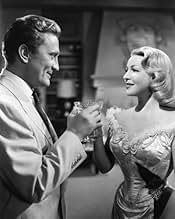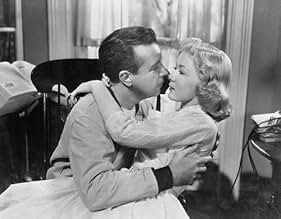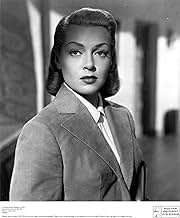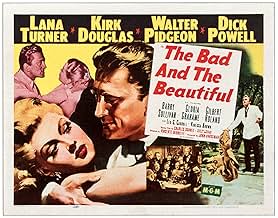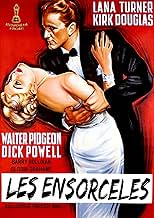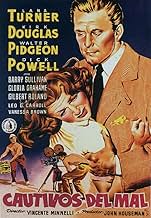IMDb-BEWERTUNG
7,7/10
17.279
IHRE BEWERTUNG
Ein skrupelloser Filmproduzent benutzt eine Schauspielerin, einen Regisseur und einen Autor, um erfolgreich zu sein.Ein skrupelloser Filmproduzent benutzt eine Schauspielerin, einen Regisseur und einen Autor, um erfolgreich zu sein.Ein skrupelloser Filmproduzent benutzt eine Schauspielerin, einen Regisseur und einen Autor, um erfolgreich zu sein.
- Regie
- Drehbuch
- Hauptbesetzung
- 5 Oscars gewonnen
- 7 Gewinne & 7 Nominierungen insgesamt
Jay Adler
- Mr. Z - Party Guest
- (Nicht genannt)
Stanley Andrews
- Sheriff
- (Nicht genannt)
Del Armstrong
- Georgia's Makeup Artist - Screen Test Scene
- (Nicht genannt)
Ben Astar
- Joe - Party Guest
- (Nicht genannt)
Barbara Billingsley
- Evelyn Lucien - Costumer
- (Nicht genannt)
Empfohlene Bewertungen
Part of what makes this film good is that Kirk Douglas's character is not shown as being completely evil - he manipulates people and can be ruthless about discarding them, but he's got real talent and is good for the career of everyone he comes in contact with. "Don't worry, some of the best movies are made by people working together who hate each other's guts," he says at one point, showing that (at least after he's established his own name) he cares most about making quality movies. I found authenticity in the nuances of this personality - he's ambitious, driven, knows how to get his way and the most out of other people, is self-aware, discerning, and artistic. Oh, and he's also kind of an asshole.
It's a film that starts slow and perhaps takes a little too long establishing his character, and the first story is a little less interesting than the two which follow. The film is told in flashbacks and explains how a director (Barry Sullivan), actor (Lana Turner), and a screenwriter (Dick Powell) don't want anything to do with him anymore after he runs afoul of each in different ways over his career. You see, he's calling them up now and hoping each will work on a new project of his, and none of them even want to talk to him.
The film really picks up with Turner; she turns in a strong performance and I loved the pathos of her story. She plays the alcoholic daughter of a great actor who doesn't have the same talent, and yet Douglas recognizes her star power. The scene where he starts questioning the shrine she has to her father and she attacks him was the point at which I thought the film may really have something. Powell is good too, and aided considerably by Gloria Grahame, who plays his wife and appears at about the 1:20 point and then lights up the screen for the moments she's on it, southern accent and all. What passion there is in the way she kisses Powell's character, and how she says "James Lee, you have a very naughty mind...I'm happy to say." The film's biggest moment belongs to Douglas however, when he explodes at Turner after she comes to his place following an opening night party - one that certainly must be among the best in his career.
Overall, it's an interesting look at Hollywood, and more generally, talent and ambition. I wasn't sure what would happen once the flashbacks were told and we returned to the present, and thought the ending was clever too.
It's a film that starts slow and perhaps takes a little too long establishing his character, and the first story is a little less interesting than the two which follow. The film is told in flashbacks and explains how a director (Barry Sullivan), actor (Lana Turner), and a screenwriter (Dick Powell) don't want anything to do with him anymore after he runs afoul of each in different ways over his career. You see, he's calling them up now and hoping each will work on a new project of his, and none of them even want to talk to him.
The film really picks up with Turner; she turns in a strong performance and I loved the pathos of her story. She plays the alcoholic daughter of a great actor who doesn't have the same talent, and yet Douglas recognizes her star power. The scene where he starts questioning the shrine she has to her father and she attacks him was the point at which I thought the film may really have something. Powell is good too, and aided considerably by Gloria Grahame, who plays his wife and appears at about the 1:20 point and then lights up the screen for the moments she's on it, southern accent and all. What passion there is in the way she kisses Powell's character, and how she says "James Lee, you have a very naughty mind...I'm happy to say." The film's biggest moment belongs to Douglas however, when he explodes at Turner after she comes to his place following an opening night party - one that certainly must be among the best in his career.
Overall, it's an interesting look at Hollywood, and more generally, talent and ambition. I wasn't sure what would happen once the flashbacks were told and we returned to the present, and thought the ending was clever too.
During this time in the early 50s there were quite a number of Hollywood pictures which scrutinised and often satirised Hollywood itself. The old studio system had been seriously weakened in the war years, the young crop of independent producers and writer-directors were gaining ever more prominence, and the dream factory as a whole had become a little more introspective, not to mention cynical. But while Sunset Boulevard, All About Eve (about the theatre, but the point carries through) and Singin' in the Rain aimed their sights at the injustice and hypocrisy of the star system, The Bad and the Beautiful takes on the thorny issue of creative control.
The Bad and the Beautiful is referenced extensively in auteurist Martin Scorsese's 1995 documentary on American movies, as an explanation of the antagonism between a producer's commercial drive and a director's artistic one. However it is far from a validation of auteur theory, for while it emphasises the importance of the director's role, it also points out (quite correctly) the equally crucial contributions of the writer and the producer himself. Incidentally the actual producer of The Bad and the Beautiful is John Houseman, primarily an actor who really only dabbled (albeit quite successfully) in production, and thus someone who could perhaps afford to snipe from the sidelines. Oddly enough screenwriter Charles Schnee would also turn to producing soon after this. He certainly shows extensive insider knowledge of the industry.
The director of The Bad and The Beautiful is Vincente Minnelli, a man whose flowing and extravagant style was put to best use in the musical genre, and although he was certainly competent in drama he does tend to overdo things a little for the form. One typically impressive Minnelli manoeuvre is the lengthy tracking shot at the party about fifteen minutes in, in which the camera is "carried" from one character to the next, while the careful arrangement of extras draws our eyes from one point of focus to another, a woman singing beautifully yet unnoticed in one corner, while a gossipy starlet is surrounded by a gaggle of admirers in another. Minnelli's tendency to keep all the characters in shot together during dialogue scenes means there is no need for back-and-forth editing. When there is a cut it is a meaningful jump, such as the close-up when Sullivan is told he won't be directing Shield's first big picture. Ultimately though the elaborate nature of Minnelli's direction is disproportionate to the needs of the picture, and a more stripped-down approach could have intensified the drama.
Another lesson The Bad and the Beautiful teaches us, both through its plot and its own example, is the importance of the right actors in a production. The majority of players in this large ensemble cast tend towards a uniform competence. People like Walter Pidgeon, Barry Sullivan and Vanessa Brown give steady, solid performances, not outstanding but apt to their characters. Dick Powell has a neat writer-ish cynicism to him, and it is only him and the vivacious Gloria Grahame that threaten to steal the show. A gratingly melodramatic Lana Turner is the only conspicuously bad player. However at the heart of The Bad and the Beautiful lies the powerful turn by Kirk Douglas. Douglas plays Shields with the mix of realism and exaggeration of a larger-than-life character, capturing the producer's boyish enthusiasm and exposing his inner fragility in a way that draws attention and lingers in the mind.
And it is here that we can see the picture's real worth. It is all very well making an accurate and incisive behind-the-scenes study of Hollywood's methods and morals, but to have any point the picture should also be an engaging and entertaining piece of storytelling. The Bad and the Beautiful is not especially romantic or funny or suspenseful, and yet it was a big hit, being the second-highest grossing picture of 1952. It seems the best thing this picture has going for it is the very character of Shields himself, who as written by Schnee and played by Douglas is both a fascinating and, yes, sympathetic individual. And the overriding message seems to be that, while producers tend to be a rather dysfunctional lot, it is their drive and efficiency that is behind many of the best things in movies. The picture's original title Tribute to a Bad Man is eminently better than the one it got saddled with. Jonathon Shields is clearly not a nice person, but through its compelling portrayal The Bad and the Beautiful salutes him.
The Bad and the Beautiful is referenced extensively in auteurist Martin Scorsese's 1995 documentary on American movies, as an explanation of the antagonism between a producer's commercial drive and a director's artistic one. However it is far from a validation of auteur theory, for while it emphasises the importance of the director's role, it also points out (quite correctly) the equally crucial contributions of the writer and the producer himself. Incidentally the actual producer of The Bad and the Beautiful is John Houseman, primarily an actor who really only dabbled (albeit quite successfully) in production, and thus someone who could perhaps afford to snipe from the sidelines. Oddly enough screenwriter Charles Schnee would also turn to producing soon after this. He certainly shows extensive insider knowledge of the industry.
The director of The Bad and The Beautiful is Vincente Minnelli, a man whose flowing and extravagant style was put to best use in the musical genre, and although he was certainly competent in drama he does tend to overdo things a little for the form. One typically impressive Minnelli manoeuvre is the lengthy tracking shot at the party about fifteen minutes in, in which the camera is "carried" from one character to the next, while the careful arrangement of extras draws our eyes from one point of focus to another, a woman singing beautifully yet unnoticed in one corner, while a gossipy starlet is surrounded by a gaggle of admirers in another. Minnelli's tendency to keep all the characters in shot together during dialogue scenes means there is no need for back-and-forth editing. When there is a cut it is a meaningful jump, such as the close-up when Sullivan is told he won't be directing Shield's first big picture. Ultimately though the elaborate nature of Minnelli's direction is disproportionate to the needs of the picture, and a more stripped-down approach could have intensified the drama.
Another lesson The Bad and the Beautiful teaches us, both through its plot and its own example, is the importance of the right actors in a production. The majority of players in this large ensemble cast tend towards a uniform competence. People like Walter Pidgeon, Barry Sullivan and Vanessa Brown give steady, solid performances, not outstanding but apt to their characters. Dick Powell has a neat writer-ish cynicism to him, and it is only him and the vivacious Gloria Grahame that threaten to steal the show. A gratingly melodramatic Lana Turner is the only conspicuously bad player. However at the heart of The Bad and the Beautiful lies the powerful turn by Kirk Douglas. Douglas plays Shields with the mix of realism and exaggeration of a larger-than-life character, capturing the producer's boyish enthusiasm and exposing his inner fragility in a way that draws attention and lingers in the mind.
And it is here that we can see the picture's real worth. It is all very well making an accurate and incisive behind-the-scenes study of Hollywood's methods and morals, but to have any point the picture should also be an engaging and entertaining piece of storytelling. The Bad and the Beautiful is not especially romantic or funny or suspenseful, and yet it was a big hit, being the second-highest grossing picture of 1952. It seems the best thing this picture has going for it is the very character of Shields himself, who as written by Schnee and played by Douglas is both a fascinating and, yes, sympathetic individual. And the overriding message seems to be that, while producers tend to be a rather dysfunctional lot, it is their drive and efficiency that is behind many of the best things in movies. The picture's original title Tribute to a Bad Man is eminently better than the one it got saddled with. Jonathon Shields is clearly not a nice person, but through its compelling portrayal The Bad and the Beautiful salutes him.
That one line summary makes me sound like I'm calling the Bad and the
Beautiful a case in 'tough love', where director Vincente Minnelli wags
his finger at what happens to some people (cough, David O. Selznick,
cough), while also showing too the joys of working in the business. But
it's a business at its most booming time, coming out of the 40s where
the producer was king, and the director had to vie for room at times to
really get his vision in. Here the producer Jonathan Shields is played
by Kirk Douglas as someone with big ideas at first- he even has an idea
to help make a scary movie about cats even more frightening by not
showing the cats (echoes of Val Lewton). Soon he rises the ranks and
becomes big enough to really call the shots all he wants, but it also
gets in the way of personal relationships, severs ties, and sometimes
even makes him out to be monstrous (there's one shot I remember all the
time where Douglas, in a big fit of anger against Lana Turner's
character, seems like he's a whole foot taller with the ego almost
manifested). The narrative of the film is a retelling by people who
knew him, a sexy but soon disillusioned actress, a director who once
worked with Shields but then got cut off from him, and a writer played
by Dick Powell.
Rashomon or Citizen Kane it is not in trying to reveal more grandiose and amazing things about human nature, but rather a supreme rumination on the good times and the bad times, possibly more of the latter.
What's great about Douglas's portrayal is that through the stories from the three ex-friends and co-workers and lovers, he becomes a very well-rounded character. At the core, of course, is the producer who at the time had as more creative say than anyone else on the set. This brings some of the great scenes ever shown about movie-making, such as the moment when Amiel, the director, tries to put Jonathan in his place about how a scene should be shot, "in order to direct a picture you need humility". Another comes with the moment when Jonathan and his soon to be 'asistant to the producer' has to object out of just being stunned. But more than Douglas, it's also tremendous, memorable screen time for Lana Turner, perhaps in her most successful performance in just sheer acting terms (not necessarily just in presence or style like in other pictures), and for Dick Powell, who with this and Murder My Sweet has two defining roles outside of his usual niche.
With many sweet camera moves, a script that crackles with the kind of scenes and dialog that makes one wish for the glory times of Hollywood's Golden Age, and at least four or five really excellent performances, The Bad and the Beautiful might not be as astounding and near-perfect as 8 1/2 or as funny as Bowfinger, but it ranks up there with the best movies about movie-making, and can make for some fine entertainment even for those who aren't really interested in how movies are made.
Rashomon or Citizen Kane it is not in trying to reveal more grandiose and amazing things about human nature, but rather a supreme rumination on the good times and the bad times, possibly more of the latter.
What's great about Douglas's portrayal is that through the stories from the three ex-friends and co-workers and lovers, he becomes a very well-rounded character. At the core, of course, is the producer who at the time had as more creative say than anyone else on the set. This brings some of the great scenes ever shown about movie-making, such as the moment when Amiel, the director, tries to put Jonathan in his place about how a scene should be shot, "in order to direct a picture you need humility". Another comes with the moment when Jonathan and his soon to be 'asistant to the producer' has to object out of just being stunned. But more than Douglas, it's also tremendous, memorable screen time for Lana Turner, perhaps in her most successful performance in just sheer acting terms (not necessarily just in presence or style like in other pictures), and for Dick Powell, who with this and Murder My Sweet has two defining roles outside of his usual niche.
With many sweet camera moves, a script that crackles with the kind of scenes and dialog that makes one wish for the glory times of Hollywood's Golden Age, and at least four or five really excellent performances, The Bad and the Beautiful might not be as astounding and near-perfect as 8 1/2 or as funny as Bowfinger, but it ranks up there with the best movies about movie-making, and can make for some fine entertainment even for those who aren't really interested in how movies are made.
"The Bad and the Beautiful" takes a look at Hollywood. This incisive take about how movies are made, directed by Vincente Minnelli, dares to go behind the scenes to show what goes on in the way the film industry operates. The film adaptation by Charles Schnee gives us a good idea of that unreal world of fantasy and hype.
At the center of the story is Jonathan Shields, a young man with connections to the industry. He wants to follow his father's footsteps and goes at it vigorously, making friends and enemies along the way. Jonathan discovers he can be ruthless whenever he wants. His first victim is Fred Amiel, the talented director who Jonathan bypasses in favor of a more established one. Jonathan quickly forgets the friendship Fred and his wife showed him before becoming a big producer.
Then there is there is Georgia Larrion, the boozy daughter of a famous actor. Jonathan shows how he wants Georgia to succeed in the business, personally taking care of selling her to star in his big project, only to betray her with another woman, a glamorous bit player. When Georgia discovers the truth, she flees Jonathan's mansion in a clear night that suddenly turns into a torrential downpour and loses control of the car, but she doesn't suffer a scratch!
The last victim of Mr. Shields is the Pulitzer prize winner, James Lee Bartlow, who Jonathan coaxes into leaving his academic life to adapt his own novel for the movies. James is married to the flighty Rosemary, in whom Jonathan discovers a weak link that will do anything to hobnob with the celebrities. Jonathan makes it easy for Rosemary to fall into an affair with the star of Shields' film.
When we first watched this film, it seemed much better, than on this viewing where a lot of things surface to make some of the story much weaker than before. Some viewers have compared this film with the fate of Orson Welles in Hollywood, and there are a couple of references that could be interpreted that way. Whether it was so, or not, it's up to the viewer to guess where the truth lies.
Kirk Douglas gave a strong performance as Jonathan Shields. Mr. Douglas showed he clearly understood who this man was. He runs away with the film, in our humble opinion. Lana Turner, a beautiful presence in any movie, is good, but at times she appears to be overwhelmed by the range of emotions she has to project, especially with that phony car scene.
Dick Powell and Gloria Graham put in an excellent appearance as the Bartlows. Barry Sullivan disappears after Lana shows up, not to be seen until the end. Walter Pigeon is effective as the studio head. Gilbert Roland is perfect as Gaucho, the Latin actor with a lot of charisma.
Mr. Minnelli shows he wasn't afraid to portray the industry the way we see it in the film, not a small accomplishment, knowing well how it could have backfired on him. Hollywood is not forgiving to those who dare to show its ugly side and that's when the parallel with Orson Welles problems with the system and eventual exile can be drawn.
At the center of the story is Jonathan Shields, a young man with connections to the industry. He wants to follow his father's footsteps and goes at it vigorously, making friends and enemies along the way. Jonathan discovers he can be ruthless whenever he wants. His first victim is Fred Amiel, the talented director who Jonathan bypasses in favor of a more established one. Jonathan quickly forgets the friendship Fred and his wife showed him before becoming a big producer.
Then there is there is Georgia Larrion, the boozy daughter of a famous actor. Jonathan shows how he wants Georgia to succeed in the business, personally taking care of selling her to star in his big project, only to betray her with another woman, a glamorous bit player. When Georgia discovers the truth, she flees Jonathan's mansion in a clear night that suddenly turns into a torrential downpour and loses control of the car, but she doesn't suffer a scratch!
The last victim of Mr. Shields is the Pulitzer prize winner, James Lee Bartlow, who Jonathan coaxes into leaving his academic life to adapt his own novel for the movies. James is married to the flighty Rosemary, in whom Jonathan discovers a weak link that will do anything to hobnob with the celebrities. Jonathan makes it easy for Rosemary to fall into an affair with the star of Shields' film.
When we first watched this film, it seemed much better, than on this viewing where a lot of things surface to make some of the story much weaker than before. Some viewers have compared this film with the fate of Orson Welles in Hollywood, and there are a couple of references that could be interpreted that way. Whether it was so, or not, it's up to the viewer to guess where the truth lies.
Kirk Douglas gave a strong performance as Jonathan Shields. Mr. Douglas showed he clearly understood who this man was. He runs away with the film, in our humble opinion. Lana Turner, a beautiful presence in any movie, is good, but at times she appears to be overwhelmed by the range of emotions she has to project, especially with that phony car scene.
Dick Powell and Gloria Graham put in an excellent appearance as the Bartlows. Barry Sullivan disappears after Lana shows up, not to be seen until the end. Walter Pigeon is effective as the studio head. Gilbert Roland is perfect as Gaucho, the Latin actor with a lot of charisma.
Mr. Minnelli shows he wasn't afraid to portray the industry the way we see it in the film, not a small accomplishment, knowing well how it could have backfired on him. Hollywood is not forgiving to those who dare to show its ugly side and that's when the parallel with Orson Welles problems with the system and eventual exile can be drawn.
One thing that I've always wondered is why no one looks at Hollywood more negatively than Hollywood itself. But whatever the reason, "The Bad and the Beautiful" pulls no punches in looking at its topic. The movie portrays some people explaining how they used to be friends of producer Jonathan Shields (Kirk Douglas) but have since turned against him. There's the director whom Shields promised a directing job but betrayed him, the writer who lost his wife to Shields's actions, and the actress whom Shields drove to madness.
I thought that one of the most effective scenes in the movie was Kirk Douglas holding Lana Turner in his arms. Here he is, this overbearing, hostile character forced to almost coddle his gorgeous female star; it might be showing how he may seemingly have exalted her, but he remains in a higher position and is merely using her and sending her into insanity. And the scene of her driving the car while completely upset elaborates on this idea.
And then, there's the writer. He and his wife move from Virginia hoping to get really big in Hollywood...until tragedy strikes. It all goes to show the disaster inherent in any industry (of course, Douglas's character exacerbates any problem). But anyway, this is a formidable part of cinema history; a precursor to movies like "The Player". Also starring Dick Powell, Walter Pidgeon and Gloria Grahame (who won Best Supporting Actress).
I thought that one of the most effective scenes in the movie was Kirk Douglas holding Lana Turner in his arms. Here he is, this overbearing, hostile character forced to almost coddle his gorgeous female star; it might be showing how he may seemingly have exalted her, but he remains in a higher position and is merely using her and sending her into insanity. And the scene of her driving the car while completely upset elaborates on this idea.
And then, there's the writer. He and his wife move from Virginia hoping to get really big in Hollywood...until tragedy strikes. It all goes to show the disaster inherent in any industry (of course, Douglas's character exacerbates any problem). But anyway, this is a formidable part of cinema history; a precursor to movies like "The Player". Also starring Dick Powell, Walter Pidgeon and Gloria Grahame (who won Best Supporting Actress).
Wusstest du schon
- WissenswertesAt 9 minutes and 32 seconds, Gloria Grahame's performance in this movie became the shortest to ever win an Oscar. She held the record until 1976, when Beatrice Straight won for her 5 minute performance in Network (1976).
- PatzerThe story takes place over an 18-year period, roughly 1934-1952, but the hairstyles and clothing of all the women, from beginning to end, are strictly 1952.
- Alternative VersionenAlso available in a computer colorized version.
- VerbindungenFeatured in Die Welt, das Fleisch und der Teufel (1959)
Top-Auswahl
Melde dich zum Bewerten an und greife auf die Watchlist für personalisierte Empfehlungen zu.
- How long is The Bad and the Beautiful?Powered by Alexa
Details
- Erscheinungsdatum
- Herkunftsland
- Sprache
- Auch bekannt als
- Cautivos del mal
- Drehorte
- Produktionsfirma
- Weitere beteiligte Unternehmen bei IMDbPro anzeigen
Box Office
- Budget
- 1.558.000 $ (geschätzt)
- Weltweiter Bruttoertrag
- 2.025 $
- Laufzeit1 Stunde 58 Minuten
- Farbe
- Seitenverhältnis
- 1.37 : 1
Zu dieser Seite beitragen
Bearbeitung vorschlagen oder fehlenden Inhalt hinzufügen




